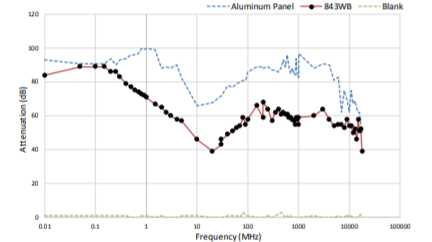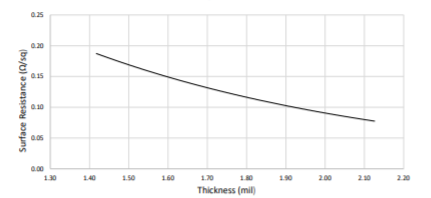Knowde Enhanced TDS
Identification & Functionality
- Technologies
- Product Families
Features & Benefits
- Labeling Claims
- Ready-to-Use Product Features
- Key Attributes
- Provides excellent EMI/RFI shielding over a broad range of frequencies
- Non-flammable and no noxious odors
- Ships as a non-DG by air
- Low VOC content
Applications & Uses
- Applications
- Compatible Substrates & Surfaces
- Recommended Preparation
- Plastic - Clean the substrate with Isopropyl Alcohol, MG #824, so the surface is free of oils, dust, and other residues.
- Drywall - For new drywall, apply directly on top of the drywall primer, after the primer has properly cured.
When applying on top of existing paint, first wash the wall with a solution of T.S.P. diluted with water at a 1:10 ratio, to ensure good adhesion.
Paint Roller
This product may be applied with a standard paint roller. Thinning is not required.
Manual Spray Guns
Use a standard fluid nozzle gun to spray the paint. The settings listed below are recommendations; however, performance will vary with different brands:
LVMP HVLP Nozzle tip diameter 1.8 mm 1.8 mm Inlet pressure 5–15 psi 5–15 psi Air flow 10–15 SCFM 8.3 SCFM Air cap 5–10 psi 5–10 psi When using a pressure pot and agitator, keep the agitator at low mixing speed with air pressure of 20–50 psi. Use the lowest pressure necessary to keep the particles suspended.
Selective Coating
For higher volume applications, paint can be applied via selective coating equipment. Use a system with constant fluid recirculation to keep the particles from settling in the lines. The fluid nozzle must be 1.8 mm in diameter and 5 - 10 psi fluid pressure is recommended.
Clean-up
Clean the spray system and equipment with tap water after use.
Properties
- Physical Properties
- Typical Properties
- Cured Properties
- Uncured Properties
| Value | Units | Test Method / Conditions | |
| Density | 1.32 | g/mL | — |
| Value | Units | Test Method / Conditions | |
| Viscosity (at 25 ˚C) | 660 | cP | — |
| Calculated VOC | 37 | g/L | — |
| Value | Units | Test Method / Conditions | |
| Resistivity | 5.3 x 10⁻⁴ | Ω·cm | — |
| Surface Resistance (at 50 μm) | 0.02 | Ω/sq | — |
| Service Temperature Range | -40 to 120 | ˚C | — |
| Value | Units | Test Method / Conditions | |
| Percent Solids | 42 | % | — |
Regulatory & Compliance
- Certifications & Compliance
- Quality Standards
Technical Details & Test Data
- Shielding Attenuation

Test performed with a two-coat thickness.
- Surface Resistance by Paint Thickness

- Cure Instructions
Allow to dry at room temperature for 24 hours, or after letting sit for 20 minutes, cure the paint in an oven for 2.5 hours @ 65 ˚C.
- Usage Parameters
Recoat Time (plastic) 20 min Recoat Time (drywall) 5 min Cure Times 24 h @ 22 ˚C 2.5 h @ 65 ˚C Recommended Film Thickness 50 μm Minimum Film Thickness 30 μm Theoretical Coverage @ 2 mil (based on 100% transfer efficiency) 47040 cm2/L
Packaging & Availability
- Packaging and Supporting Products
Cat. No. Packaging Net Volume Net Weight 843WB-15ML Jar 12 mL 15.8 g 843WB-150ML Bottle 150 mL 198 g 843WB-850ML Can 850 mL 1.12 kg 843WB-3.78L Can 3.60 L 4.76 kg
Storage & Handling
- Shelf Life
- 2.5 Years
- Storage
Store between -20 and 27 ˚C in a dry area, away from sunlight (see SDS). If exposed to freezing temperatures during storage or transport, keep product at room temperature for at least two days and ensure it is fully homogeneous prior to use.

